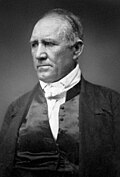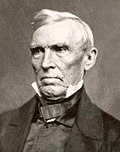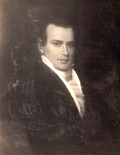| 1860 presidential election | |
  Nominees Bell and Everett | |
| Convention | |
|---|---|
| Date(s) | May 9–10, 1860 |
| City | Baltimore, Maryland |
| Venue | Old First Presbyterian Church |
| Candidates | |
| Presidential nominee | John Bell of Tennessee |
| Vice-presidential nominee | Edward Everett of Massachusetts |
The 1860 Constitutional Union National Convention met on May 9, 1860, in Baltimore, Maryland. It was the only national convention ever held by the Constitutional Union Party, which was organized largely by former Whig Party members from the Southern United States who opposed secession. The convention nominated former Senator John Bell of Tennessee for president and former Secretary of State Edward Everett of Massachusetts for vice president.
Contents
- Background
- Presidential nomination
- Presidential candidates
- Vice presidential nomination
- Vice presidential candidates
- References
- Further reading
Bell won the presidential nomination on the second ballot of the convention, defeating Everett, Governor Sam Houston of Texas, Senator John J. Crittenden of Kentucky, former Governor William Alexander Graham of North Carolina, Associate Justice John McLean of Ohio, and several other candidates. In the 1860 presidential election, Bell and Everett finished third in the electoral vote and fourth in the popular vote.








